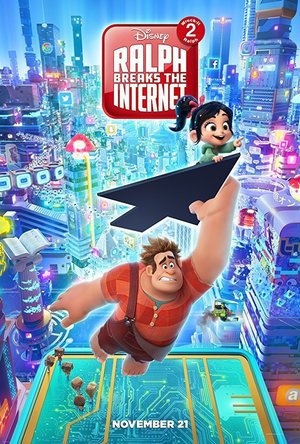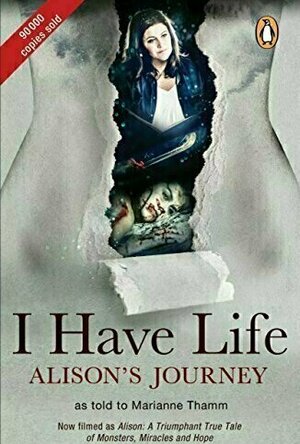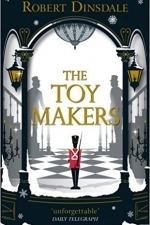
Dots & Co: A Puzzle Adventure
Games and Entertainment
App
***NEW from the creators of #1 App Store Hits DOTS and TWO DOTS*** Explore beautiful landscapes and...
Lee (2222 KP) rated Ralph Breaks the Internet: Wreck-It Ralph 2 (2018) in Movies
Dec 12, 2018
In an attempt to help his friend and spice things up for her, Ralph decides to smash a new race course through the Sugar Rush landscape. But things don't go quite according to plan, resulting in a broken steering wheel on the arcade machine. Unfortunately, the company responsible for making that machine is no longer in business so parts for it aren't readily available, or too expensive to buy online, so the plug gets pulled on the machine. With the future of the game in jeopardy, and with the Sugar Rush inhabitants having to find new homes with the other arcade residents, Ralph and Vanellope decide to try and help. The arcade has just had a Wi-fi router plugged in, and they overheard one of the kids in the arcade earlier talking about the steering wheel being available online on some site called eBoy? So, they decide to go investigate this thing called the internet.
I've seen a few reviews that draw comparisons to this movie and with 'Ready Player One' from earlier this year. As we entered the Oasis of Ready Player One, we were treated to an amazing visual onslaught of wonderful imagery and instantly recognisable characters. And, as Ralph and Vanellope enter the internet, it's a similarly enjoyable experience. Recognisable brands and websites are everywhere you look, either as buildings or with their concepts imaginatively represented in some form. Twitter birds fly around, characters force suspicious looking spam adverts in your face while busy web traffic is everywhere, constantly being directed to its next destination. Ralph and Vanellope eventually find their way to eBay, where the steering wheel they need is currently being auctioned, but they don't really understand the bidding process and end up winning it for more money than they can possibly pay. They then set about finding a way to get rich quick so that they can pay for the wheel and get it shipped to the arcade before the game gets removed for scrap. Their journey takes them to an online game called 'Slaughter Race', a violent racing game featuring skilled racer Shank (voiced by Gal Gadot), a world which immediately excites racing fiend Vanellope, who feels right at home.
It's great to see the characters of Ralph and Vanellope back on our screens. Ralph is still very funny and Vanellope is still extremely cute! There are also a large number of sections of the movie which work very well and are extremely enjoyable. Aside from the initial introduction to the internet, and the whole Slaughter Race segment, probably the most enjoyable portion is the visit to Disney and the Disney princesses, which received such a big reaction when featured in the various trailers for the movie. And we don't just get the princesses either, we also get to see Marvel and Star Wars characters too! Another chance to scour the screen to try and spot background characters, and a reminder that Disney is in fact slowly taking over the world!
Towards the end of the movie I felt that things weren't so interesting and enjoyable, with a lengthy segment involving a virus and how it spreads and manifests itself, threatening the whole internet. But that's a minor negative from me in what is overall a hugely enjoyable sequel. There are also a number of very strong messages throughout, from the Disney princesses and the way they act, to the way that internet negativity is portrayed. I'm not sure of the longevity of this movie though - after all, at the speed the internet develops these days, how many of the sites or concepts featured are going to still be around or even relevant in another 6 years time?
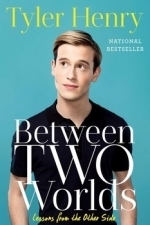
Between Two Worlds
Book
From Tyler Henry, a twenty-year-old clairvoyant and star of E!’s hit reality series Hollywood...
Biography Spirituality
Heather Cranmer (2721 KP) rated I Have Life: Alison's Journey in Books
May 13, 2021
Reading about Alison's abduction, rape, and attempted murder will definitely leave you with your jaw on the floor. Alison holds nothing back about anything throughout her biography whether it is the horrific events that happened to her or her will to survive emotionally after her wounds have healed. Marianne Thamm, the journalist that Alison told her story to in order to write her biography does a wonderful job of tying everything together for the most part. About halfway through though, I felt like I Have Life stopped being a biography and started becoming a self-help book with Alison writing (speaking to Thamm) about how to become a happier person. Luckily, this only lasts for a few chapters, but I felt like maybe the chapters about being happier and such should be in a self-help book. (Alison gives talks around the world about her ordeal, so perhaps that's why these chapters were included?) Otherwise Marianne Thamm's writing of Alison Botha's biography was flawless. I was immersed the whole time. I felt like I was right besides Alison the whole time. I kept wanting there to be a different outcome when Alison was abducted by Frans even though I knew there wouldn't be. I felt like Alison really wants the stigma for rape survivors to be no more (and she's right as there shouldn't be any stigma attached). I felt like everything I wanted to know about Alison was answered in I Have Life - from what happened to Alison at the point of her abduction, the rape, the brutal attempted to murder, to the trial of her rapists and attacker to how her life was like at the writing of the book. Like I said, Thamm and Alison don't really leave anything to the imagination of which I was grateful.
All in all, I Have Life is a deeply disturbing book to read, but it does have a great outcome. It is well put together, and Alison Botha comes across as such a strong inspirational woman. Alison's story is full of hope and wisdom throughout. I would definitely recommend I Have Life: Alison's Journey as told to Marianne Thamm for those ages 18+ who are into true crime or for those that just want to see how strong the human will is to survive.

ELSA Speak - Accent Reduction
Education and Games
App
Learn to speak English doesn’t have to be scary and lonely anymore. With ELSA - your English...
Naomi Forrest (42 KP) rated The Toy Makers in Books
Jan 2, 2019
‘See the woman with the cage of pipe-cleaner birds, the vagrant soldier marvelling at the stuffed dogs lounging in their baskets? Keep a careful eye on them; you will see them again’.
I knew just from this descriptive ‘setting the scene’ chapter this book was going to be amazing, there was so much magic encapsulated in those first five pages. Papa Jack’s Emporium is the most wonderful shop you could imagine, a labyrinth of joy, surprises around every aisle and so much more. If you have ever seen the toy shop on Home Alone 2 that looked so amazing as a child, it has nothing on this! I was pretty sure for at least half of the book that Papa Jack was indeed Father Christmas.
After the initial chapter, the reader is introduced to Cathy, a fifteen year old who, shamefully (the year is 1906), is unmarried and pregnant. Plans are made for her to go to a special home where she will give birth and her child will be adopted. However, Cathy spots an advert looking for staff for the Emporium and runs away and so, the magic begins! The reader is catapulted into the world of the emporium and soon meets Papa Jack’s sons, Emil and Kaspar, who assist their father in the running of the store and the making of the toys, which are so much more than toys as we know them. People flock from far and wide to the emporium for it’s sublime creations and the memories and pleasures that they evoke.
The first half of the novel was like a fairytale, building beautifully to a gorgeous climax, full of wonder, friendship and subtle romance (perfectly done, so as not to detract from more pressing themes). In my head, toy soldiers and paper trees were everywhere and the wendy house is the stuff that dreams are made of. I loved observing (as I stood in the corner of the emporium, I’m sure, so convincing is Dinsdale) the relationships the built between Cathy and Emil and Cathy and Kaspar, though at times I felt sorry for Emil, never quite catching up to Kaspar as he wishes. If only the story had ended at page 187. And yet, that would not have been satisfying, not enough, so really, I’m glad it didn’t.
The second part of the novel, that is where Dinsdale really takes us on a journey. A couple of darker themes are touched upon in part one, where we learn of Jekab’s history (Papa Jack) but it ramps up in the second part, which ties in with World War I and beyond. You would think going from such wonderment and happiness to a bleak world of misery and reality would make you want to stop reading but I could not put this book down. I read 3/4 of it in one go! It is in the second part that Dinsdale brings in themes of shell shock, betrayal, sibling jealousy, bitterness and true, deep, familial love. Without spoilers, some characters truly lose everything and I cried during and after the book as it moved me so greatly (I mean, I am a crier anyway but not usually with books!). The entire novel is shaped around the ‘war’ between the brothers with some shocking twists along the way. Though part two draws in more realities, more brutalities and some heartbreaking moments, magic still punctuates and carries the reader through to the end. The ending is bitter sweet and my emotions were cloudy here, anger, joy, sadness and warmth all merging into a big teary mess.
I won’t say too much about specifics because some kinds of magic need to be discovered for yourself. The most beautiful sentiment in this novel though is that toys can’t save a life but they can save a soul, because toys transport many of us back to times of happiness, of wonder and of innocence, when things were simpler and problems remedied more easily. Times change but the joy of toys doesn’t. I can recall going through toy exhibits at both the castle museum in York and a toy museum in Edinburgh and it was so thrilling not only to see toys from my childhood but toys from before. Toys have the power to make magic we never knew existed, even if it is only in our head. The Toy Makers has yielded many comparisons with Erin Morgensten’s The Night Circus but for me, this novel surpassed anything I have read before in a similar vein. I have truly been blown away into a world that I honestly believe I will carry with me forever more. If, like me, you are a Harry Potter fan, you will know what I mean when I say that this book matches up to that first trip to Diagon Alley, to Hogwarts and to Honeydukes or that journey up Enid Blyton’s faraway tree as a child but it is even more exciting as an adult. It isn’t only the description that is first rate though; Dinsdale’s narrative style and use of language pulls you in and flows so smoothly, you are carried away from the first page whether you are prepared for it or not. Some reviews have said it is too fantastical but I cannot rate this book highly enough. It isn’t always easy reading – prepare to have your heart broken in several places- but go in looking for magic. You won’t be disappointed!

Lonely Planet Pocket Kuala Lumpur
Robert Kelly and Lonely Planet
Book
Lonely Planet: The world's leading travel guide publisher Lonely Planet Pocket Kuala Lumpur is your...
Rosie Lewis, presumably a penname, has been a professional foster carer for over seven years. During this time, she has dealt with children and teenagers from all sorts of backgrounds who are usually facing some form of crisis or difficulty. In latter years, Rosie has begun to combine her love of writing with her fostering experiences by writing story-like memoirs. <i>Taken</i> is Rosie’s latest publication, which reveals how emotionally challenging fostering can be.
Rosie first met Megan when she was only a few days old, struggling with the effects of neonatal abstinence syndrome and a cleft plate. Removed from her mother’s care – a drug addict – Megan needs a temporary home to go to. Rosie is more than happy to take care of Megan until her “forever home” can be found.
As time goes on, Rosie and her children become attached to the little girl and include her as part of the family. Megan’s salient recovery turns her into an energetic, slightly precocious toddler who absolutely adores Rosie’s family as much as they love her. But Rosie knows she will eventually have to say goodbye, no matter what her feelings.
Rosie explains to the reader how difficult it is to function properly as a foster carer once strong emotions have got involved. She dreams of being able to keep Megan forever, but when a couple are found who desperately want a child, Rosie has no choice but to say goodbye.
It is heartbreaking to see the effects of the separation on Rosie as well as on Megan, who, despite Rosie’s attempts to elucidate the situation, does not fully comprehend what is going on. Guiltily hoping that Megan’s irascible behaviour, or a cataclysmic event, puts the new parents off adoption, Rosie says goodbye to the little girl she loves with all her heart. However, her hopes are raised when it becomes clear the adoption is not sitting as well with the new parents as much as they originally hoped. Perhaps Rosie has a chance to become Megan’s “forever mummy” after all?
Told from Rosie’s professional perspective, readers are taken on a journey from a child’s unstable beginning, to a time when they are at peace with the world. It is impossible to be unaffected by the events in Megan’s life, or experience versions of Rosie’s own emotions.
Many foster carers, social workers and nurses have put their experiences onto paper to share with the world. Most are good storytellers and are able to create a tale that could almost be fiction, with good use of vocabulary and imagery. At times, it felt like Rosie was attempting to tell a story, but instead ended up with a formal account of events. As the book progressed, however, the reader becomes so invested in Megan’s wellbeing that this issue becomes unnoticeable.
Unlike stories about older children in care, Megan’s life is easier to read about since, being fostered as a new born baby, she has no demoralizing past to overcome. Taken is by far the happier story within its genre, not least because of its satisfying ending, but from the joy Megan brings to the lives of everyone around her, too. Those new to this style of book may find <i>Taken</i> a good way of easing themselves into the genre, rather than jumping in with a story about a child with a background full of unspeakable things.
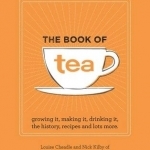
Book of Tea: Growing it, Making it, Drinking it, the History, Recipes and Lots More
Book
*SHORTLISTED for The Fortnum & Mason Food & Drink Awards 2016* This is a book about tea but not as...

Lonely Planet East Coast Australia
Lonely Planet, Charles Rawlings-Way, Peter Dragicevich and Anthony Ham
Book
Lonely Planet: The world's leading travel guide publisher Lonely Planet East Coast Australia is your...
